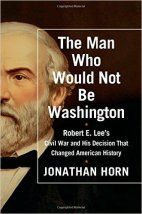The Man Who Would Not Be Washington: Robert E. Lee's Civil War and His Decision That Changed America

The Man Who Would Not Be Washington: Robert E. Lee's Civil War and His Decision That Changed American History - Jonathan Horn
Non-Fiction
Pages: 384
My major criticism of this book? It's too short. And I don't say that in a 'I loved it, hated getting to the end, could have read ten times as much' kind of way. I mean that it's too short to do justice to its subject. Leaving aside plate sections, notes and the bibliography, it's little more than 200 pages, and that is just not enough, not even close enough, to treat the topic of Robert E. Lee and his wartime career with the kind of focus and attention it warrants.
To be honest, I'm not even entirely sure what this book is trying to be. It isn't a biography of Lee, even though it may appear to be and seems to be marketed as such. But it skips over huge chunks of Lee's life - we skip straight from his marriage to his service during the Mexican War, for example, a leap of some 15 years. It isn't an investigation of his Civil War generalship, because again, aside from focusing on a few key battles it doesn't delve into any kind of depth there. It seems to be some kind of curious amalgam of abbreviated biography, potted wartime sketch, and extended essay on the links and parallels between Lee and George Washington.
That there were such links is undeniable. Lee was married to Washington's granddaughter-by-marriage after all, his father had served closely with Washington during the Revolution, Lee lived in houses and on plantations with direct links to Washington, was gifted one of Washington's swords. He was considered by many to be a kind of spiritual heir to Washington, a man who never had children of his own and therefore lacked any direct heirs. If Washington was 'first in peace, first in war and first in the hearts of his countrymen', as Lee's father described him as such in his eulogy, then many in the South considered Lee in the same manner. And yet Lee, for all these parallels and for all his reverence and awe of Washington, fought against the Union Washington created, rebelled against the government created by Washington, deliberately turned against all that Washington stood for. The decision that Lee made, 'the decision that changed America', as the title calls it, shredded every link and bond Lee had with Washington.
It is a interesting topic, but alas not one I feel is done justice here. A psychological profile of Lee would be a fascinating read - he comes across here as a man so wedded to the notion of self-denial, so determined not to follow in the footsteps of his father, that he have deliberately acted against his own inclinations and desires his entire life, as indeed he did when choosing to forsake the Union, since Lee actually opposed secession. A man, indeed, who could not even rebel against rebellion. I'm not sure such a man is entirely deserving of the kind of respect and admiration history has bestowed on him, from both sides of the Mason-Dixon line...